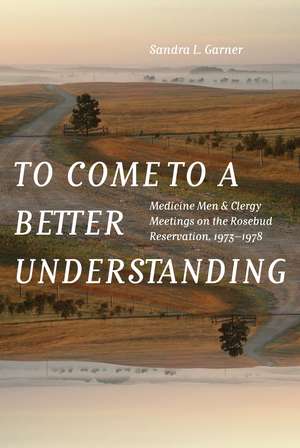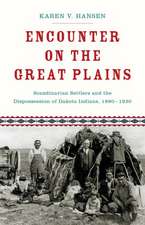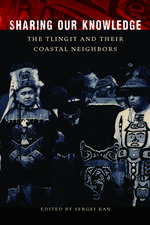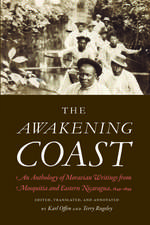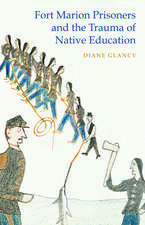To Come to a Better Understanding: Medicine Men and Clergy Meetings on the Rosebud Reservation, 1973–1978
Autor Sandra L. Garneren Limba Engleză Hardback – iun 2016
To Come to a Better Understanding analyzes the cultural encounters of the medicine men and clergy meetings held on Rosebud Reservation in St. Francis, South Dakota, from 1973 through 1978. Organized by Father Stolzman, a Catholic priest studying Lakota religious practice, the meetings fit the goal of the recently formed Medicine Men’s Association to share its members’ knowledge about Lakota thought and ritual. Both groups stated that the purpose of the historic theological discussions was “to come to a better understanding.” Though the groups ended their formal discussions after eighty-four meetings, Sandra L. Garner shows how this cultural exchange reflects a rich Native intellectual tradition and articulates the multiple meanings of “understanding” that necessarily characterize intercultural encounters.
Garner examines the exchanges of these two very different cultures, which share a history of inequitable power relationships, to explore questions of cultural ownership and activism. These meetings were another form of activism, a “quiet side” without the militancy of the American Indian Movement. Based on ethnographic fieldwork and archival analysis, this volume focuses on the medicine men participants—who served as translators, interpreters, and cultural mediators—to explore how modern political, social, and religious issues were negotiated from an indigenous perspective that valued experience as critical to understanding.
Garner examines the exchanges of these two very different cultures, which share a history of inequitable power relationships, to explore questions of cultural ownership and activism. These meetings were another form of activism, a “quiet side” without the militancy of the American Indian Movement. Based on ethnographic fieldwork and archival analysis, this volume focuses on the medicine men participants—who served as translators, interpreters, and cultural mediators—to explore how modern political, social, and religious issues were negotiated from an indigenous perspective that valued experience as critical to understanding.
Preț: 323.73 lei
Nou
Puncte Express: 486
Preț estimativ în valută:
61.95€ • 64.84$ • 51.56£
61.95€ • 64.84$ • 51.56£
Carte tipărită la comandă
Livrare economică 31 martie-14 aprilie
Preluare comenzi: 021 569.72.76
Specificații
ISBN-13: 9780803285606
ISBN-10: 0803285604
Pagini: 210
Ilustrații: index
Dimensiuni: 152 x 229 x 22 mm
Greutate: 0.46 kg
Editura: Nebraska
Colecția University of Nebraska Press
Locul publicării:United States
ISBN-10: 0803285604
Pagini: 210
Ilustrații: index
Dimensiuni: 152 x 229 x 22 mm
Greutate: 0.46 kg
Editura: Nebraska
Colecția University of Nebraska Press
Locul publicării:United States
Notă biografică
Sandra L. Garner is an assistant professor of American studies at Miami University.
Cuprins
Acknowledgments
1. Which Kind of Indian Will Show the Way?
2. Isákhib (Alongside)
3. “I’m in This Bilingual”
4. “How Can We Get to the People?”
5. “Given to Them by the Supernatural”
6. “Practice His Religion”
7. “You Don’t Understand Us”
Notes
Bibliography
Index
Recenzii
“We are experiencing a reassessment of twentieth-century American Indian activism. Where all roads once led to the American Indian Movement, we now see multiple pathways leading to multiple destinations. By focusing on interactions between the Medicine Men Council and Catholic clergy at Rosebud, Sandra Garner shows us yet another dimension of this important story.”—Brian Hosmer, H. G. Barnard Chair of Western American History at the University of Tulsa and coeditor of Tribal Worlds: Critical Studies in American Indian Nation Building
“A vitally important book that combines community-based research with fine-grained archival investigation. . . . The result is a compelling narrative that successfully demonstrates how multiple and sometimes competing viewpoints existed within the Indigenous rights movements of the 1960s and 1970s.”—C. Joseph Genetin-Pilawa, assistant professor of history at George Mason University and author of Crooked Paths to Allotment: The Fight Over Federal Indian Policy after the Civil War
